
JICE’s International Exchange
Voice from Participant

Interview with Ms. Mariko Kristina Daisey, a Participant in KAKEHASHI Project 2016
KAKEHASHI
Program in Japan
Ms. Mariko Kristina Daisey, who visited Japan through the KAKEHASHI Project in 2016, was studying abroad to Meiji Gauin University in Japan.
―Why did you participate in the KAKEHASHI Project in 2016?
I participated in the Kakehashi Project to learn more about my heritage. I am a third-generation Japanese American and saw Kakehashi as an opportunity to learn more about my Japanese side and engage with Japanese culture. I also was eager to travel to the country and meet other individuals that were close to my age also participating in the program.
―What do you think was the most impressive part in the KAKEHASHI Project? Please tell us in details about the good points of the program. If you noticed something that could be improved, please kindly inform us.
We were able to visit different places and attend workshops to learn about different industries in Japan. What impressed me the most was the host-family experience. Some other girls in the program and I stayed with a host mother for a few days, and it was a very authentic experience as we got to eat homemade meals and visit a local temple. I also liked how, at the conclusion of the program, us participants all had to discuss our trip and what we would do upon returning to the United States to tell others about our experience and encourage more people to learn about Japan. I think it is important to take time to reflect on an experience and learn from it. I was also very satisfied with the food places we went to because Japanese food is delicious.
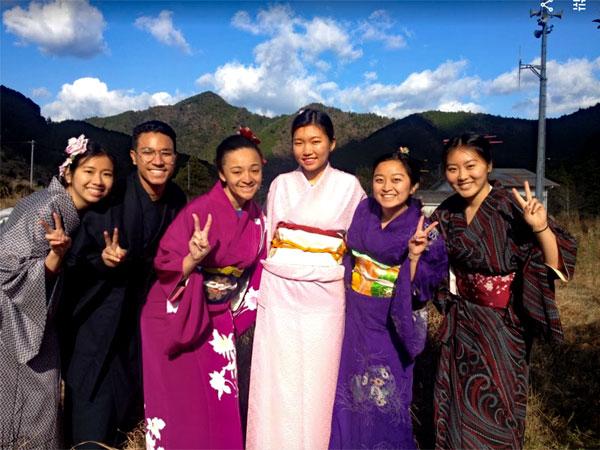

Interview with Mr. Syed Abdul Halim, a Participant in JENESYS2017 SAARC 8 Coutries
JENESYS
Program in Japan
Mr. Syed Abdul Halim, who visited Japan through the JENESYS2017 program in November 2017, is working as an architect assistant at Public Works Department Project Implementing Unit (PWD-PIU) in JICA assisted Urban Building Safety Project.
―Why did you participate in JENESYS2017?
When I applied for the JENESYS2017, I was a student of Masters in Japanese Studies at the University of Dhaka. I wanted to relate my academic knowledge of Japan to reality. As a working student, I could hardly manage any scope to visit Japan at my own expense. JICE organized JENESYS program gave me the perfect opportunity. The program not only carried out all the traveling and living expenses but also provided a guided tour as well as a chance to live with a Japanese family. You know, it is hard to get the chance to stay with a native family as a foreign traveler. But the JENESYS generously makes the scope for you. Thus, this program allows us to experience the Japanese society, people, technology, innovation, history and architecture. That's why I participated in the JENESYS2017.
―What do you think was the most impressive part in the JENESYS2017? Please tell us in details about the good points of the program. If you noticed something that could be improved, please kindly inform us.
The most impressive part of the JENESYS was living with a Japanese family. This part of the program is truly like a 'chocolate box', you don't know what will happen next. Because, as our batch was divided into small groups and sent to different families, the experience is different from person to person. Let talk about it in detail.
Me with my two friends from Bangladesh were kind of adopted by the Kawamonzen family. I used the word "adopted" because we felt that we were treated just like her other two sons. Okasan (host mother) was a very kind-hearted and generous person, always smiling and caring. We spent three nights at her house. Every night, she made our bed and ensured that the bed, as well as the room, was properly heated, though we were old enough to make it on our own. She kept in mind that we were from a tropical country and the cold weather of northern Japan was completely new to us. She prepared a table full of dishes for us literally. As we are Muslims, she managed halal meat for us which was pretty expensive there. Taking us to the local market, she told us to choose any food or fruits that we would like to eat. I chose a packet of persimmon and she paid for it. Later, when we went to her friend's house,we found that there were a whole lot of persimmons for us to eat. Okasan knew it but she granted me what I chose at the market. In the books, we read that Japanese people are cautious in spending but Okasan's generosity changed our preconceived idea.


Interview with Ms. Acero Rosabella Mae, a Participant in KAKEHASHI Project 2018
KAKEHASHI
Program in Japan
Ms. Acero Rosabella Mae, who visited Japan through the KAKEHASHI Project in 2018, is plannning to work as an ALT, Assistant Language Teacher in Japan.
―Why did you participate in the KAKEHASHI Project?
I am very interested in learning about Japan and Japanese culture and wanted to use my knowledge of Japan and Canada to bridge both countries.
―What do you think was the most impressive part in the KAKEHASHI Project? Please tell us in details about the good points of the program. If you noticed something that could be improved, please kindly inform us.
I really enjoyed the versatility of the KAKEHASHI Project. I was able to witness Japan in multiple perspectives such as political with the lecture we received, industrial when we visited the Panasonic museum, historical when we visited Hikone castle and through the homestay we were able to experience everyday Japanese life.
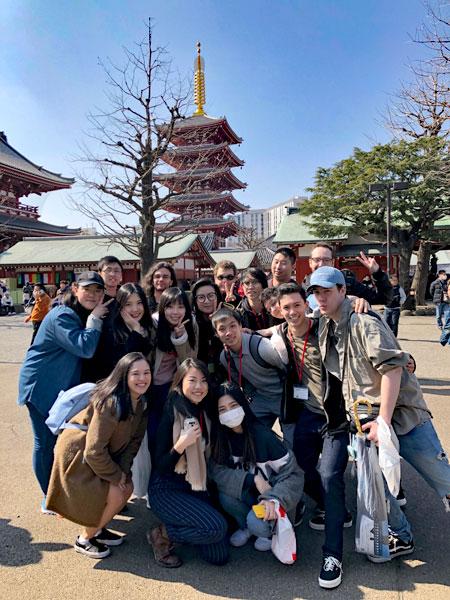

Interview with Mr. Nebada Wathurage Thusitha Dilshan, a Participant in JENESYS2015 SAARC 8 Coutries
JENESYS
Program in Japan
Mr. Thusitha Dilshan, who visited Japan through the JENESYS2015 program with the theme of energy in Jan. 2016, is studying Tourism management as a Ministry of Education, Culture, Sports, Science and Technology (MEXT) scholar at Toyo University masters course.
His interview video is publised on our Facebook, which was taken as he visited JICE.
Interview : vol.1
―Why did you participate in the JENESYS2015?
It was a dream from my childhood to visit Japan. When I was an undergraduate, my university asked us to apply for this program, I was much delighted and applied for the JENESYS2015 program, and luckily got selected. It was indeed a golden opportunity which I started to love Japan.
―What is the most impressive part in the JENESYS2015?
All parts of the program had an unique experience and impression. Among them, home stay program was the most memorable and impressive experience for me. There were three students from Sri Lanka who visited same family for homestay program and non of us could manage Japanese language. Even our Otosan (father) and Okasan (mother) could not speak good English. But we enjoyed a lot and communicated so many things by using different methods. Their unique and traditional farming house gave us a wonderful experience. And the very first onsen experience is un-erasable from my mind.
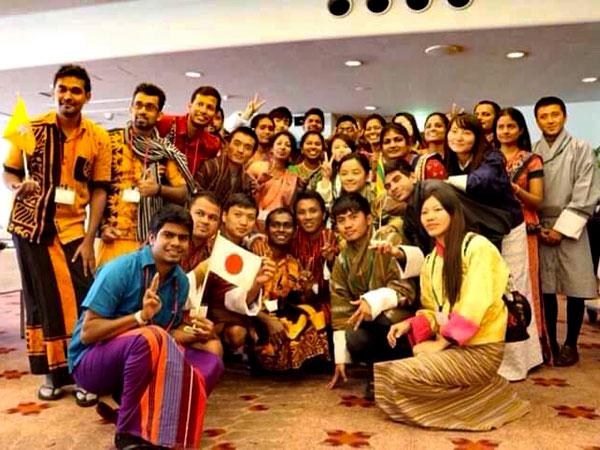

Interview with Mr. Trishit Banerjee, a Participant in JENESYS2.0
JENESYS
Program in Japan
Mr. Trishit Banerjee, who visited Japan through the JENESYS2.0 program in 2014, is studying at Tohoku University. He won the Minister of Education, Culture, Sports, Science and Technology Award (Grand Prize) on the 8th Annual All Japan Student English Presentation Contest (organized by KANDA GAIGO GROUP and The Yomiuri Shimbun) held in 2019.
His Interview video is published on our Facebook.
Interview : vol.1 / vol.2 / vol.3
―What is the most impressive/memorable part in JENESYS2.0?
JENESYS 2.0 in 2014 was the first time I travelled outside India. I did not know what to expect as I had very little knowledge about Japan. I had many stereotypes about Japan. However, my visit to a local school in Musashino area, Tokyo really changed the way I looked at the world. I met a young student who taught me Japanese traditional tea ceremony. In the end, when I asked her what she wanted to become when she grew up; she said that she wanted to become a sweet-maker. Her reply impressed me a lot and I began wondering, in a big city like Tokyo where she could have become anything, why she dreamt of being a sweet-maker. Her true passion and the sense of dignity about labor inspired me to look at our world with a positive attitude. I returned to India with even more confidence about pursuing my dreams no matter what happens.
―How was the support from JICE staff and coordinator through the program? Any suggestions for improvement?
The JICE Staff and Coordinators were extremely supportive and made my trip memorable. Ichihashi Hitomi-san was coordinating my group and she made sure we were ok throughout our trip. She sent us off up to the security checkpoint at Narita Airport. Today, we are still in touch and I meet her whenever I visit Tokyo. This goes on and proves the extent of support JICE was providing us, which make me feel as if I am a part of a big Japanese family.


Interview with Mr. Alex Berner, a Participant in KAKEHASHI Project 2017
KAKEHASHI
Program in Japan
Mr. Alex Berner, who visited Japan through the KAKEHASHI Project in 2017, is working as an ALT, Assistant Language Teacher in Okinawa.
―Why did you participate in the KAKEHASHI project in 2017?
I participated in the KAKEHASHI Project in 2017 because I wanted to experience Japan and its culture before committing to applying, and ultimately accepting, a role on the JET Program as an ALT. It was a great opportunity to meet fellow college students from Japan.
―What is the most impressive part in the KAKEHASHI?
For me, the most impressive part in KAKEHASHI was how well the program was organized and how receptive everyone was to meet and exchange with the members. I really enjoyed the warm receptions we were given by the Japanese students when we visited and I only hope they enjoyed the reception we offered them when they visited us in the States!


Interview with Ms. Munkhchimeg Erdenebileg, a Participant in JENESYS2009
JENESYS
Program in Japan
Ms. Munkhchimeg Erdenebileg, who visited Japan through the JENESYS program in 2009, is studying abroad in UK. In the summer of 2019 she visited Japan again to work for a month in Osaka on an internship. As finished internship, she visited JICE.
―Why did you participate in the JENESYS program 2009?
Since age of five or six years old, which is around the same time I entered my 1st grade, I started being interested in Japanese culture and language. My high school provided with an extra language course, apart native and main foreign languages. I had choose between German and Japanese, and without hesitation my decision was Japanese, which I started being taught since 5th grade. I have been familiar with JENESYS Program during my studies, thus I always dreamed and aimed to achieve a grant for JENESYS 2009 Participant. Accomplishing this endeavor was my first and last time being proud of myself, until now- the reason I came back after ten years. Likewise, going to Japan in 2009 was my first time traveling abroad and being on myself.
―What is the most impressive part in the JENESYS?
I received this amazing recognition with highest respect and emotional gratefulness. Every day and every minute was so meaningful to me that I did not wanted to sleep until late night, or I used to wake up very early in the morning to experience Japanese daily life.Undeniably meeting Japanese Host Family-Fujimura Family is one of the highlights. Also, going to the Chuo University, where I met the Students Union President, who is non-Japanese and works part-time at Soft Bank along with his studies. He bought me a Chuo University branded gift and shared about his student life abroad. Listening to his talk and looking around the Japanese University culture encouraged my willingness to study abroad even more. Moreover, I felt quite nervous and honored to attend a meeting at Ministry of Foreign Affairs in Tokyo. I remember everything, food, places, smell and occasions, because every moment was so special. On another note, I think the testimony of a “Hibakusha” – an atomic bomb survivor – in Hiroshima was a very memorable moment. It really moved me and provided me a more profound understanding on how it affected the Japanese collective memory and their relationship with technology.


Interview with Mr. Thomas Gonda, a Participant in MIRAI2018
Others
Program in Japan
Mr. Thomas Gonda, who visited Japan through the MIRAI program in 2018, is working as a Research Intern at the RCA-IIS Tokyo Design Lab which is a design project jointly established by The University of Tokyo Institute of Industrial Science and Technology and Royal College of Art in London.
―Why did you participate in the MIRAI program 2018?
I decided to participate to the MIRAI program 2018 because Japan has always fascinated me, and this was a unique opportunity to get a deeper understanding of its culture but also the role Japan is playing in the global economy. Having lived in different countries, I am very conscious of the fact that being exposed to different environments, cultures and people is always an enriching experience.
―What is the most impressive part in the MIRAI?
I think the MIRAI programme was a unique opportunity to be exposed to a wide variety of topics and industries in a condensed one week. That kind of experience is very rare and precious especially for young students like me. With that, I was able to get a good picture of the Japanese ecosystem of Science & Technology – how the government, industries, research bodies and ultimately Japanese people interact with each other. That local understanding also enabled me to understand the role that Japan plays in a wider international context.
On another note, I think the testimony of a “Hibakusha” – an atomic bomb survivor – in Hiroshima was a very memorable moment. It really moved me and provided me a more profound understanding on how it affected the Japanese collective memory and their relationship with technology.
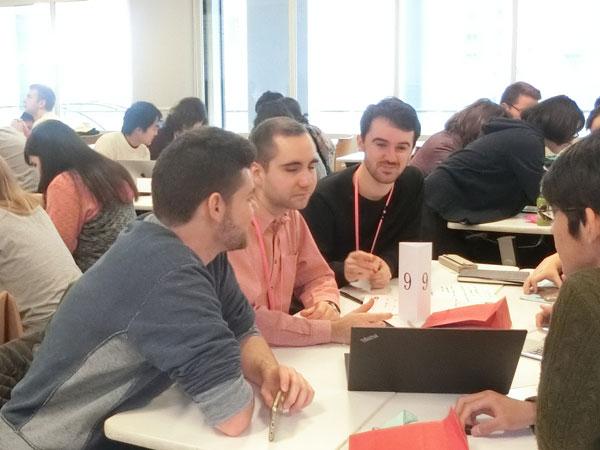

Interview with Ms. Anastasiya Saukova, a Participant in MIRAI2018
Others
Program in Japan
Ms. Anastasiya Saukova, who visited Japan through the MIRAI program in 2018, is studying Japanese as a second foreign language at university. She won the third place in the Japanese Speech Contest hosted by the Embassy of Japan in Belarus in this March.
―Why did you participate in the MIRAI program 2018?
For almost 3 years, I have been studying the Japanese language at Minsk State Linguistic University of the Republic of Belarus, but I have never been to the Land of the Rising Sun. I major in interpreting and translation. In order to help establish communication between the Japanese and the Belarusians, a better understanding of Japan in all its aspects is essential, so I decided to broaden my horizons. Being a keen person and having a great interest in Japan, I have experience of participating in various events related to its culture and language such as movie weeks, culture festivals and workshops, volunteering and art contests. For many years I had been reading books about Japanese worldview, history and traditions. I was fascinated by movies about Japanese history. Then I encountered Japanese people who made me understand that both of our countries have something in common and that we may be close spiritually while being geographically far away from each other, so I wanted to check my assumptions and spread my findings. Moreover, I have always striven to travel and explore new things. I felt that studies were not enough for me, I strongly believed that I had many things to learn from the program, which shined like a gem waiting to be discovered. Moreover, various teachers at school and university told me a lot of good things about programs in Japan, so I just followed their advice, applied and was lucky to be admitted.
―What is the most impressive part of the MIRAI?
It was Japan itself – in all its shapes and forms, colours and shades, tastes and likings – that impressed me most of all. I enjoyed comparing the things I saw, heard and tasted with my previous expectations. I cherish every single minute I spent in Japan visiting the MOFA and prestigious universities, participating in cultural workshops, sharing the experience with the organisers and participants, walking along night city streets, eating tempura and drinking matcha tea. By diving into the atmosphere of the country and talking to its people, I enriched my personality and reconsidered my worldview.
The most touching part of the program was the meeting with the atomic bomb survivor Kiriaki Chieko. We had a chance to discuss serious issues regarding the impact of Hiroshima bombing and global cooperation. As a citizen of Belarus, which suffered from the catastrophic nuclear accident at the Chernobyl nuclear power plant and still bears the scars of such a huge disaster, I felt strongly compassionate about the stories she emotionally shared.
In a nutshell, the program was beneficial for my studies and future, so I express my gratitude to all the teachers, who helped me to improve English and Japanese, to the Embassy of Japan in Belarus for choosing me, to the JICE and MOFA of Japan for well-planned activities and unforgettable experience.
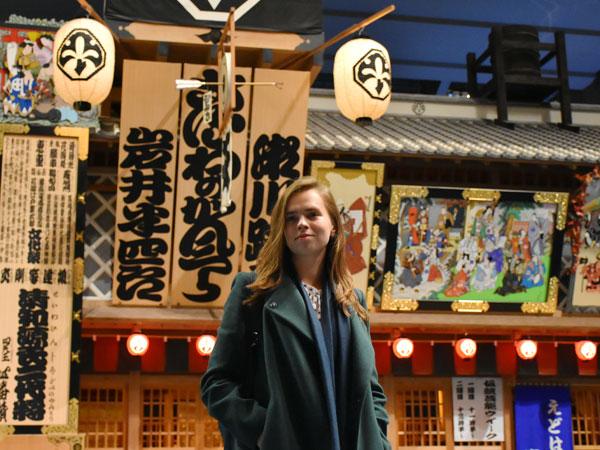

Interview with Ms. Mary Joy Tabal, a Participant in JENESYS2.0
JENESYS
Program in Japan
Ms. Mary Joy Tabal, who took part in the JENESYS2.0 sports exchange program for marathon runners in September 2014, is currently training in Japan for Tokyo Olympics qualification. She is a Filipina marathon runner who took part in the Rio Olympics in 2016. She won a gold medal in the women’s marathon in the 2017 Southeast Asian Games.
―Why did you participate in the JENESYS2.0 program? What is the most impressive part in the program?
I was glad to participate in the JENESYS2.0 for youth athletes since Japan is one of the best countries which can compete on world’s top stage.During the program, we were privileged to visit some training facilities and race venue in Tokyo and Yamanashi. We enjoyed Japanese foods and we have a chance to see Mt. Fuji as well.A training with Yamanashi Gakuin University students was impressive because it was my first time to train with athletes of the same age.
―Did JENESYS make any effect on your career?
After joining JENESYS, I shared my experience in Japan as one of the top athletes in the Philippines. I also conducted grassroots programs for unfortunate children and taught them how to run.
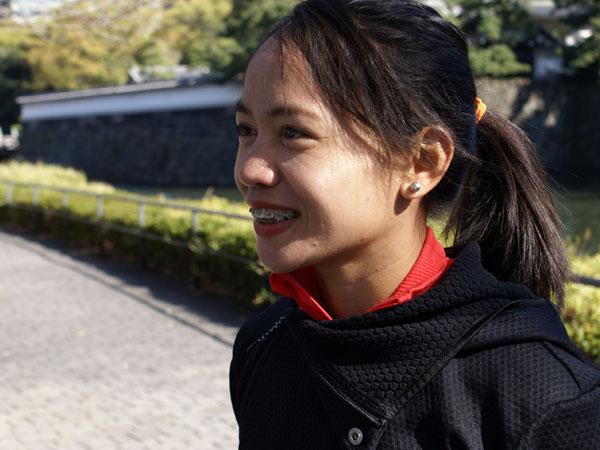
Contact us
JICE Youth Exchange Division, International Exchange Department
